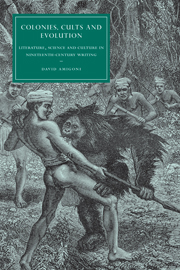Book contents
- Frontmatter
- Contents
- Acknowledgements
- Introduction: literature, science and the hothouse of culture
- 1 ‘Symbolical of more important things’: writing science, religion and colonialism in Coleridge's ‘culture’
- 2 ‘Our origin, what matters it?’: Wordsworth's excursive portmanteau of culture
- 3 Charles Darwin's entanglements with stray colonists: cultivation and the species question
- 4 ‘In one another's being mingle’: biology and the dissemination of ‘culture’ after 1859
- 5 Samuel Butler's symbolic offensives: colonies and mechanical devices in the margins of evolutionary writing
- 6 Edmund Gosse's cultural evolution: sympathetic magic, imitation and contagious literature
- Conclusion: culture's field, culture's vital robe
- Notes
- Bibliography
- Index
- CAMBRIDGE STUDIES IN NINETEENTH-CENTURY LITERATURE AND CULTURE
Introduction: literature, science and the hothouse of culture
Published online by Cambridge University Press: 22 September 2009
- Frontmatter
- Contents
- Acknowledgements
- Introduction: literature, science and the hothouse of culture
- 1 ‘Symbolical of more important things’: writing science, religion and colonialism in Coleridge's ‘culture’
- 2 ‘Our origin, what matters it?’: Wordsworth's excursive portmanteau of culture
- 3 Charles Darwin's entanglements with stray colonists: cultivation and the species question
- 4 ‘In one another's being mingle’: biology and the dissemination of ‘culture’ after 1859
- 5 Samuel Butler's symbolic offensives: colonies and mechanical devices in the margins of evolutionary writing
- 6 Edmund Gosse's cultural evolution: sympathetic magic, imitation and contagious literature
- Conclusion: culture's field, culture's vital robe
- Notes
- Bibliography
- Index
- CAMBRIDGE STUDIES IN NINETEENTH-CENTURY LITERATURE AND CULTURE
Summary
‘LIFE, LIFE, LIFE’: A READING AND WRITING RELATION
In Culture and Anarchy (1869), Matthew Arnold offered his gospel proclaiming sweetness and light. ‘Culture’ would speak through ‘all the voices of human experience … of art, science, poetry, philosophy, history, as well as of religion’. The many-sided receptor of culture would then look and listen: ‘Consider these people, then, their way of life, their habits, their manners, the very tones of their voice’ (97). Arnold had listened, and his response was to satirise. One vocal tone to receive this treatment belonged to the poet Robert Buchanan, who had celebrated God’s ‘move to multiplicity’ and ‘divine philoprogenitiveness’. Arnold cites Buchanan’s language praising God’s ‘love of distribution and expansion into living forms’ at length:
Every animal added seems a new ecstasy to the Maker; every life added, a new embodiment of his love. He would swarm the earth with beings. There are never enough. Life, life, life, — faces gleaming, hearts beating, must fill every cranny. Not a corner is suffered to remain empty. The whole earth breeds and God glories.
(215)Arnold’s discourse on ‘culture’ here cites and confronts a discourse on ‘life’ and its divinely sanctioned reproductive urges. Buchanan’s language celebrating divinely created and cherished swarms of living things is derived in part from Christian traditions of agape, and in part from the popular science of phrenology.
- Type
- Chapter
- Information
- Colonies, Cults and EvolutionLiterature, Science and Culture in Nineteenth-Century Writing, pp. 1 - 30Publisher: Cambridge University PressPrint publication year: 2007



